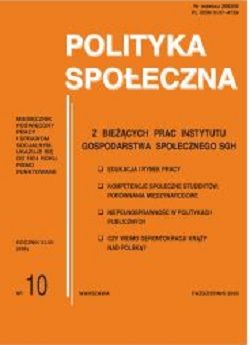
- Education and the labor market in Poland - selected issues
Education is seen as the strength of a well-functioning economy. Education that meets the needs of the labor market becomes the goal of educating young people and employees who want to adapt to changes taking place on the labor market. Therefore, education in Poland still faces a challenge - how to shape the teaching process and influence the learning process so that education is a significant factor in increasing the quality of human and social capital. Modern education should take into account the changing needs of the labor market, including the needs of current and future employees and employers. An important challenge of education in Poland is adjusting its structure and curricula to the needs of employees not only in the internal - national labor market, but also in the labor markets of other countries, primarily European. At the same time, the Polish education system must be competitive with the education systems of other European countries in order to prepare employees ready to work in different countries
- Integrated qualifications system - a tool linking education with the labor market
The article presents the solutions of the Integrated Qualifications System, introduced by statutory regulations. Modernizing the national qualifications system by implementing the Polish Qualifications Framework and the Integrated Qualifications Register allows for the gradual integration of various subsectors of the education system in which qualifications are awarded. The Polish Qualifications Framework, as the basis of the Integrated Qualifications System, is a common frame of reference for qualifications awarded in Poland. The second new instrument is the Integrated Qualifications Register, which contains detailed information on qualifications included in the Integrated Qualifications System, together with information on the awarding entities and quality assurance procedures. System solutions introduced by the Act on the Integrated Qualifications System unite the education system in Poland, supporting citizens in lifelong learning and acquiring high-quality qualifications needed in the modern labor market
- Shaping the social competences of students in the light of public policies of higher education in Germany, the Netherlands, Poland, Latvia, the Czech Republic and Great Britain
Shaping the social competences of university graduates is one of the most important challenges today. The cognitive objectives of the Erasmus + DASCHE project, the selected results of which are presented in this article, were: (1) recognizing good practices in shaping students' social competences in selected higher education centers, (2) supporting public policies in the field of higher education at the European and national levels, and at universities in the field of designing, shaping and verifying students' social competences and formulating recommendations in this regard. The project was carried out using the case studies method at 26 universities. The characteristics of social competences adopted in it say that these are metacompetences built on knowledge and skills, enriched with axiological reflection, allowing for their independent and responsible use for social benefits. The article presents an analysis of public policies in Germany, the Netherlands, Poland, Latvia, the Czech Republic and Great Britain in the context of their impact on whether and how universities shape students' social competences and whether they are obliged, encouraged or supported by regulations legal, development strategies, national qualifications framework and external quality assurance systems. DASCHE's research indicates a large diversity of national public policies in this regard and - with the widespread recognition by the academic staff of the importance of shaping student attitudes - a significant lack of conscious actions leading to their shaping at the national and institutional as well as European level.
- The process of creating public policy towards disability
Our goal is to analyze the process of creating public policy in Poland against disabilities on the example of implementing the assumptions of the UN Convention on the Rights of Persons with Disabilities. The key tool we use is the model of the five streams of the public policy process: problem, solutions, political competition, process and program. In particular, we look at the role played by the environment of people with disabilities in this process. We put forward the thesis that their weakness and the genesis of activism of people with disabilities other than in Western countries makes the implementation of the convention in Poland difficult and often ends in failure.
- Aging and old age in research on the environment of a social farm institute
Aging and old age are becoming increasingly important topics of research and publication. Social and economic conditions as well as the consequences of old age are increasingly important for social policy. The Institute of Social Economy has been dealing with this issue since the 1960s. The team of the Institute of Social Economy conducted the first representative nationwide survey of the situation of old people. Later, employees and associates of the Institute participated in and managed other nationwide research, and conducted a lot of research in the field of gerontology. The subject of scientific works concerned mainly the living conditions of old people and social policy towards old people, as well as the organization and financing of long-term care. The aim of the article is to present the main directions of scientific work of the IGS community in the field of social gerontology and the description of scientific achievements in this field.
Polityka Społeczna (Social Policy) - the whole list







